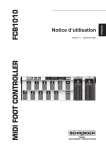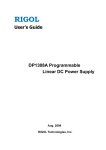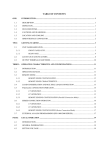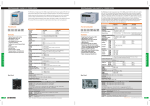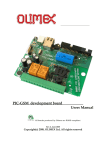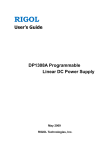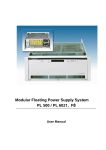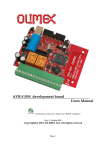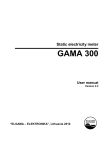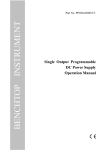Download GW Instek PSM-Series DC Power Supplies
Transcript
PSM-SERIES PROGRAMMABLE POWER SUPPLY PSM-SERIES PROGRAMMABLE POWER SUPPLY USER MANUAL CONTENTS USER MANUAL PAGE 6. MAINTENANCE ................................................................................46 1. PRODUCT INTRODUCTION ............................................................1 6-1. FUSE REPLACEMENT .......................................................................46 1-1. DESCRIPTION .....................................................................................1 6-2. LINE VOLTAGE CONVERSION ..........................................................46 1-2. FEATURE............................................................................................2 6-3. MEASUREMENT TECHNIQUES..........................................................47 2. TECHNICAL SPECIFICATIONS......................................................3 6-4. ADJUSTMENT AND CALIBRATION ....................................................50 6-5. CLEANING .......................................................................................56 3. PRECAUTIONS BEFORE OPERATION .........................................6 7. THE SYSTEM DIAGRAM AND DESCRIPTION .........................57 3-1. UNPACKING THE INSTRUMENT ..........................................................6 3-2. CHECKING THE LINE VOLTAGE .........................................................6 3-3. ENVIRONMENT ..................................................................................7 7-1. BLOCK DIAGRAM ............................................................................57 7-2. THE CONFIGURATION OF BLOCK SYSTEM .......................................58 4. PANEL INTRODUCTION...................................................................8 4-1. FRONT PANEL ....................................................................................8 4-2. REAR PANEL BRIEF ..........................................................................10 4-3. DISPLAY BRIEF.................................................................................11 5. OPERATION INSTRUCTION..........................................................15 5-1. BASIC OPERATION ...........................................................................15 5-2. FUNCTION KEY DESCRIPTION..........................................................16 5-3. OPERATION METHOD ......................................................................33 5-4. THE MAXIMUM VALUE OF THE OUTPUT SETTING .............................44 5-5. TEST LEAD ......................................................................................45 ⎯ i ⎯ ⎯ ii ⎯ PSM-SERIES PROGRAMMABLE POWER SUPPLY PSM-SERIES PROGRAMMABLE POWER SUPPLY USER MANUAL USER MANUAL SAFETY TERMS AND SYMBOLS FOR UNITED KINGDOM ONLY These terms may appear in this manual or on the product: WARNING. Warning statements identify condition or practices that could result in injury or loss of life. NOTE: This lead/appliance must only be wired by competent persons WARNING: THIS APPLIANCE MUST BE EARTHED IMPORTANT: The wires in this lead are coloured in accordance with CAUTION. Caution statements identify conditions or practices that could result in damage to this product or other property. The following symbols may appear in this manual or on the product: the following code: Green/ Yellow: Blue: Brown: Earth Neutral Live (Phase) As the colours of the wires in main leads may not correspond with the colours marking identified in your plug/appliance, proceed as follows: The wire which is coloured Green & Yellow must be connected to the DANGER ATTENTION Protective Earth (ground) Frame or Chassis High Voltage refer to Manual Conductor Terminal Terminal Terminal Earth terminal marked with the letter E or by the earth symbol or coloured Green or Green & Yellow. The wire which is coloured Blue must be connected to the terminal which is marked with the letter N or coloured Blue or Black. The wire which is coloured Brown must be connected to the terminal marked with the letter L or P or coloured Brown or Red. If in doubt, consult the instructions provided with the equipment or contact the supplier. ⎯ iii ⎯ ⎯ iv ⎯ PSM-SERIES PROGRAMMABLE POWER SUPPLY PSM-SERIES PROGRAMMABLE POWER SUPPLY USER MANUAL This cable/appliance should be protected by a suitably rated and approved HBC mains fuse: refer to the rating information on the equipment and/or user instructions for details. As a guide, cable of 0.75mm2 should be protected by a 3A or 5A fuse. Larger conductors would normally require 13A types, depending on the connection method used. Any moulded mains connector that requires removal /replacement must be destroyed by removal of any fuse & fuse carrier and disposed of immediately, as a plug with bared wires is hazardous if a engaged in live socket. Any re-wiring must be carried out in accordance with the information detailed on this label. USER MANUAL Declaration of Conformity We GOOD WILL INSTRUMENT CO., LTD. No. 95-11, Pao-Chung Rd., Hsin-Tien City, Taipei Hsien, Taiwan GOOD WILL INSTRUMENT (SUZHOU) CO., LTD. No. 69 Lushan Road, Suzhou New District Jiangsu, China. declare that the below mentioned product PSM-3004/6003/2010 are herewith confirmed to comply with the requirements set out in the Council Directive on the Approximation of the Law of Member States relating to Electromagnetic Compatibility (89/336/EEC, 92/31/EEC, 93/68/EEC) and Low Voltage Equipment Directive (73/23/EEC, 93/68/EEC). For the evaluation regarding the Electromagnetic Compatibility and Low Voltage Equipment Directive, the following standards were applied: ◎ EMC EN 61326-1: Electrical equipment for measurement, control and laboratory use –– EMC requirements (1997+A1: 1998+A2:2001) Conducted and Radiated Emissions Electrostatic Discharge EN 55011: 1998 EN 61000-4-2: 1995+A1:1998+A2:2001 Current Harmonic Radiated Immunity EN 61000-3-2: 2000 EN 61000-4-3: 1996+A1:1998+A2 :2001 Voltage Fluctuation Electrical Fast Transients EN 61000-3-3: 1995+A1:2001 EN 61000-4-4: 1995+A2:2001 Surge Immunity ------------------------EN 61000-4-5: 1995+A1:2001 Conducted Susceptibility ------------------------EN 61000-4-6: 1996+A1:2001 Power Frequency Magnetic Field ------------------------EN61000-4-8 :1993+A1:2001 Voltage Dips/ Interrupts ------------------------EN 61000-4-11: 1994+A1:2001 ◎ Safety Low Voltage Equipment Directive 73/23/EEC & amended by 93/68/EEC IEC/EN 61010-1: 2001 ⎯ v ⎯ ⎯ vi ⎯ PSM-SERIES PROGRAMMABLE POWER SUPPLY PSM-SERIES PROGRAMMABLE POWER SUPPLY USER MANUAL 1. PRODUCT INTRODUCTION USER MANUAL 1-2. Feature 1) 1-1. Description and accuracy. PSM-series Programmable Power Supply is controlled by Micro Processor Unit (MPU) with extreme high accuracy of 200W maximum, and the single output with double range (switching between the main panel and communication interface) that can easily connect communication interface RS-232 or GPIB to computer in order to satisfy users’ demand for auto-testing and auto-control. The software commands are fully complied with the SCPI format, it’s convenient for user to proceed auto-tested and auto-controlled application program. The voltage and current are completely controlled by 16 bits D/A Converter with higher resolution and accuracy. Also, the digitalization of 2) High stability and low draft. 3) Excellent contrast and brightest VFD display. 4) Single output and double range. 5) Constant voltage/current operation. 6) Low ripple and noise. 7) The convenient and high efficiency operation of setting interface. 8) Wheel knob for Fine and Coarse adjustment and item selection. 9) Both front and rear panels are equipped with Remote voltage sensing. 10) The protection function of output ON/OFF and Over Voltage/Current/ Temperature protection. system makes a speedy, precise and convenient input of information controlled by keyboard. The adjustment of voltage/current is made by software calibration without manual error that will increase the preciseness of the instrument. The function of Over Voltage Protection (OVP) and Over Current 11) Intelligent control fan (Vary with different output power). 12) Warning signal by the built-in Buzzer. 13) A programmed calibration procedure. 14) The brand new panel design and the 1/2 rack size reduction volume design. Protection (OCP) is set with software and detected with hardware to achieve protected function precisely and speedily in order to secure users from danger An overall digitalization of programmable interface with high resolution 15) Save and Recall function of 100 groups setting and proceed together with auto operation can achieve the purpose of auto test. by using the instrument. If need further technique support or update information, please enter our web-side: http://www.goodwill.com.tw 1 16) IEEE-488.2 and SCPI compatible command setting. 17) Correspond to many safety regulations. ⎯ 2 ⎯ PSM-SERIES PROGRAMMABLE POWER SUPPLY PSM-SERIES PROGRAMMABLE POWER SUPPLY USER MANUAL USER MANUAL 2. TECHNICAL SPECIFICATIONS Specification DC Output PSM-2010 PSM-3004 Low Range 0~ +8V / 0~20A 0~ +15V / 0~ 7A 0~ +30V / 0~6A High Range 0~ +20V/0~ 10A Regulation (% output + offset) 0~ +30V/0~4A Line regulation ≦ 0.01% +2mV Voltage Ripple & <350uVrms/ <350uVrms/ Noise 3mVpp 2mVpp Regulation Constant (% output + Current offset) Operation 0~ +60V/0~3.3A Load regulation ≦ 0.01% + 2mV Constant Operation PSM-6003 <500uVrms/ 3mVpp, <1mVrms/ 3mVpp (Rating voltage >50V) Load regulation ≦ 0.01% + 250uA Line regulation ≦ 0.01% +250uA 2mArms Front Panel PSM-3004 PSM-6003 Accuracy Programming (@23℃±5℃), ±(% output + offset) Readback (@23 ℃ ±5 ℃ ), ±(% output + offset) OVP/OCP Accuracy, ±(% output + offset) Voltage 0.05% + 10mV Current 0.2% + 10mA Voltage 0.05% + 5mV Current 0.15% + 5mA Voltage 0.1% + 10mV Current 0.4% + 10mA Interface Command average proceeding time 100ms during receiving GPIB or Resolution Readback PSM-2010 proceeding time (The Ripple & Noise Programming Specification Voltage 1mV 1mV 2mV Current 1mA 0.5mA 0.5mA Voltage 0.5mV 0.5mV 1mV Current 1mA 0.1mA 0.5mA Voltage 1mV Current 1mA(<10A),10mA(≧ 10A) OVP 10mV OCP 10mA ⎯ 3 ⎯ RS-232 command until voltage output) Load Voltage Setting Time Response Time Rise (Resistor Load) Fall Full No Full No Full No Load Load Load Load Load Load 95ms 45ms 50ms 20ms 80ms 100ms 30ms 450ms 45ms 400ms 30ms 450ms Stability ±(% of output + offset): Following 1 hour warm-up, the output level drift after 8 hours test under a fixed load, test lead and ambient temperature. ⎯ 4 ⎯ PSM-SERIES PROGRAMMABLE POWER SUPPLY PSM-SERIES PROGRAMMABLE POWER SUPPLY USER MANUAL USER MANUAL 3. PRECAUTIONS BEFORE OPERATION Specification PSM-2010 PSM-3004 PSM-6003 Voltage 0.02% + 1mV Current 0.1% + 1mA Memory Store/Recall points 0~99 Temperature Coefficient per ℃±(% of output + offset) : Maximum change in output / readback per ℃ after 30-minute warm-up. Voltage 0.01% + 3mV Current 0.02% + 3mA 100VAC, 120VAC, 220VAC ±10%, AC Input 230VAC, –6%+10%, 50/60Hz Input Rating 700VA, 380W 300VA, 220W 600VA, 310W Interface RS-232, GPIB Power cord ×1, Instruction manual×1, Accessories (1) Programmer Manual×1 CE Safety Type Common terminal terminal Item Test Lead 1 1 set Sense Lead 0 1 set Accessories (2) Grounding Lead 0 1 Short bar A 3 0 on Front panel Short bar B 3 3 on Rear panel Indoor use Altitude up to 2000 m Ambient temperature: Operation To satisfy specifications : 10℃~ 35℃( 50° F ~ 95°F ) Environmental Maximum operating ranges: 0℃~ 40℃( 32°F ~ 104°F ) Relative humidity: 85% RH (max.) non condensing Pollution degree: 2 Storage Temperature & -10℃to 70℃, 70%RH (maximum) Humidity Dimensions & Weight 230(W)×140(H)×380(L) mm. Approx. 10kg. ⎯ 5 ⎯ 3-1. Unpacking the Instrument The product has been fully inspected and tested before shipping from the factory. Upon receiving the instrument, please unpack and inspect it to check if there is any damage caused during transportation. If any sign of damage is found, notify the bearer and/or the dealer immediately. 3-2. Checking the Line Voltage The product can be applied by any kind of line voltages shown in the table below. Before connecting the power plug to an AC line outlet, make sure the voltage selector of the rear panel is set to the correct position corresponding to the line voltage. It might be damaged the instrument by connecting to the wrong AC line voltage. WARNING. To avoid electrical shock the power cord protective grounding conductor must be connected to ground. When line voltages are changed, replace the required fuses shown as below: Model PSM-2010 PSM-3004 PSM-6003 Line voltage Range Fuse T 7A 250V 100V 90-110V T3.15A 120V 108-132V 250V T 5A 250V ⎯ 6 ⎯ Line voltage 220V 230V Range Fuse T3.15A 250V 198-242V T 1.6A 216-250V 250V T2.5A 250V PSM-SERIES PROGRAMMABLE POWER SUPPLY PSM-SERIES PROGRAMMABLE POWER SUPPLY USER MANUAL USER MANUAL 4. PANEL INTRODUCTION WARNING. To avoid personal injury, disconnect the power cord before removing the fuse holder. 4-1. Front Panel Connect the AC power, then press ON/OFF power switch. Indicate the setting of voltage/current value, Display output voltage/current value and the status of setting and output. +Output Terminal Positive output terminal. S+ Output Terminal Positive sampling terminal. -Output Terminal Negative output terminal. S- Output Terminal Negative sampling terminal. GND Terminal Connect the ground terminal to chassis. Rotary Encoder Wheel knob. < > Cursor (for value input). A software to lock up panel setting (keep LOCK pressing for a few second). V SET Output voltage setting. I SET Output current setting. Over Voltage protection value setting. OVP SET (Level, ON/OFF, Clear) Over Current Protection value setting. OCP SET (Level, ON/OFF, Clear, DELAY) Select output voltage /current range (The 20V, 10A/8V,20A secondary function key). RECALL ⇧ Recall last group of data setting. Warning. When query the memory setting data, in order to avoid personal injury and damaging the 1. Power Switch 3-3. Environment 2. The normal ambient temperature range of this instrument is from 0° to 40°C (32° to 104°F). To operate the instrument exceeding this specific temperature range may 3. cause damage to the circuits of instrument. Do not use the instrument in a place where strong magnetic or electric field exists as it may disturb the measurement. 4. CAUTION. To avoid damaging the instrument, do not use it in a 5. 6. 7. place where ambient temperature exceeds 40℃. 8. 9. 10. 11. 12. 13. 14. RECALL ⇩ ⎯ 7 ⎯ machine, it is suggested to disconnect the output. Recall next group of data setting. ⎯ 8 ⎯ PSM-SERIES PROGRAMMABLE POWER SUPPLY PSM-SERIES PROGRAMMABLE POWER SUPPLY USER MANUAL 15. DELAY AUTO RANGE 16. (AUTO INFO) 17. AUTO 18. RECALL Set the voltage and current output time in the automatic operation mode. Proceed setting step by step. During setting proceeding, press this key can display the memory address of the setting and its residual time and period (The secondary function key). Turn ON/OFF the auto operation. Recall one of the memory datas (The secondary function key). When query the memory setting data, in order to avoid personal injury and damaging the machine, it is suggested to disconnect the output. 19. STORE 20. SHIFT 21. “0”, “1”… “9”, “.” 22. ENTER 23. LOCAL 24. GPIB/RS-232 V STEP 25. I STEP I△ I▽ 26. V△ V▽ Store the data to one of the memory groups (The secondary function key). Select the secondary function key. The key for number input. The key for Input confirmation. Clear the remote control mode by using the panel control setting instead. Select GPIB or RS-232 by pressing [SHIFT] [GPIB/RS-232]. Voltage Step setting (The secondary function key). Current Step setting (The secondary function key). Under the status of [SHIFT], press I △ to ascend one step of output current value. Under the status of [SHIFT], press I ▽ to descend one step of output current value. Under the status of [SHIFT], press V △ to ascend one step of output voltage value. Under the status of [SHIFT], press V ▽ to descend one step of output voltage value. ⎯ 9 ⎯ USER MANUAL 27. FL DIMMER 28. 29. OUTPUT 30. DISPLAY LIMIT Adjust the intensity of VFD. After pressing [SHIFT], can press [FL DIMMER] continually until the required brightness is reached. Then press again the [SHIFT] to end the setting. Set beeper by pressing [SHIFT][ ] to turn ON/OFF the buzzer. Turn on or off output by pressing the knob. Switch over the voltage and current mode by pressing [DISPLAY LIMIT]. The setting value will be displayed, press again [DISPLAY LIMIT] or wait a few seconds to return to the previous status. 4-2. Rear Panel brief 1. AC Power Socket 2. AC Select Switch 3. Cooling Fan 4. Interface 5. Output Terminal AC power input terminal. Switch Voltage to 100V, 120V, 220V or 230V, 50/60Hz. A cooling fan. GPIB or RS-232 communication interface. The output terminals of rear panel connected with case, including output sampling terminal and ground terminal. ⎯ 10 ⎯ PSM-SERIES PROGRAMMABLE POWER SUPPLY PSM-SERIES PROGRAMMABLE POWER SUPPLY USER MANUAL USER MANUAL 4-3. Display brief When the power supply is set to operation mode, the symbol of “*” will be lighted up. z When the Output is on, the symbol of “*” 9. * 1. Adrs 2. Rmt 3. ERROR 4. SHIFT 5. AUTO 8V, 15V, 20V, 6. 30V, 60V 7. OVP 8. OCP Set the power supply to the address of Listen or Talk by using the interface card. Set the power supply to Remote Control mode. The Error message appears when the command from the Remote Controlled Interface is in error. Select the second level function. Set the power supply to Auto mode. The output ranges of power supply. When the indicator lights up without blinking, means the OVP function is on. When the Over Voltage Protection function is triggered, the indicator will be changed to blinking status, and the message “OVP TRIPPED” will be displayed. Now clear the OVP function. When the light of indicator is off, means the OVP function is off. When the indicator lights up without blinking, means the OCP function is on. When the Over Current Protection function is triggered, the indicator will be changed to blinking status, and the message “OCP TRIPPED” will be displayed. Now clear the OCP function. When the light of indicator is off, means the OCP function is off. ⎯ 11 ⎯ 10. CC 11. CV 12. 13. Lock lights up to indicate the power supply is in the operation mode, when the meter displays the measurement value, the symbol of “*” becomes blinking. The CC light is on to indicate the instrument is in the CC mode. The CV light is on to indicate the instrument is in the CV mode. The light of “ ” is on to indicate the buzzer is on. The Lock light is on to indicate the panel control knobs is locked up. ⎯ 12 ⎯ PSM-SERIES PROGRAMMABLE POWER SUPPLY USER MANUAL PSM-SERIES PROGRAMMABLE POWER SUPPLY USER MANUAL Figure 4-1 Front Panel Figure 4-2 Rear Panel ⎯ 13 ⎯ ⎯ 14 ⎯ PSM-SERIES PROGRAMMABLE POWER SUPPLY PSM-SERIES PROGRAMMABLE POWER SUPPLY USER MANUAL 5. OPERATION INSTRUCTION USER MANUAL z When the output is set to OFF, the OUTPUT OFF message will be displayed on the front panel, the setting still can be modified. At the same 5-1. Basic Operation time of modification, the corresponding setting item or status will be z The applied Voltage/Current Unit for this series instruments is Volt and displayed. When the output is set to ON, the setting can also be modified. Amp. At the same time of the modification, the panel display mode is changed z The Instrument requires 30 minutes warm-up with no load before from measurement value to the setting item or status. Under the normal operation or calibration to achieve rated accuracy. setting of voltage or current, the panel will display measurement value, if z The Factory setting is in panel operation mode that enable user to operate want the instruments directly from panel control knob. Besides, when the displayed mode to setting value, press automatically. working. Whenever the power is reset, the output will be at OFF status the output is always at OFF status, and the setting is stayed at the the no value is input, the display mode will be switched to measurement value unless the LOCAL key is pressed, at this time, the OUTPUT is still z The series of power supplies have double output ranges, after power on, change [SHIFT][DISPLAY LIMIT] to input setting value, after a few seconds, if remote controller is on line, the operation can only be proceed through it, and the operation is through front panel operation mode. to z When set output on, the symbol of “*” will be appeared on the upper left of meter to indicate the instrument is at output mode. when the meter displays output measurement value(at measuring status), the symbol of previous setting status before power off. z Whatever the output is at ON or OFF, the output range can be switched dynamically. During the switch process, if the original setting value is z “*” becomes blinking. 5-2. Function Key Description more than the maximum output range after switch, the setting value will Press one of the function keys to proceed function setting, after setting, be modified automatically to the maximum output value after switch. press again the function key to leave the function or press another key for A short plate is attached to the sampling terminal of the front panel, another setting. when use the remote sense, the short plate must be removed. ⎯ 15 ⎯ z V SET : Output voltage setting ⎯ 16 ⎯ PSM-SERIES PROGRAMMABLE POWER SUPPLY PSM-SERIES PROGRAMMABLE POWER SUPPLY USER MANUAL USER MANUAL z I SET : Output current setting The minimum resolution of output voltage is at 1mV. When set output to ON, press [V SET] to proceed voltage setting, now the meter will display measurement value (the symbol of “*”is blinking). Besides, The minimum resolution of output current is at 1mA(output≧ 10A at when the operation is set to “DISPLAY LIMIT” mode, the meter will 10mA). When set output to ON, press [I SET] to proceed current setting, display setting value (the symbol of “*” lights up without blinking). the meter will display measurement value (the symbol of “*” is on with When the output is set to OFF, the output voltage setting (V SET) can blinking). Besides, when the operation is set to “DISPLAY LIMIT” be done by pressing [V SET] directly or by changing the “DISPLAY mode, the meter will display setting value (now the symbol of “*” is on LIMIT” mode (please refer to the operation of DISPLAY LIMIT). without blinking). When the output is set to OFF, the output current Setting method 1: Press [V SET][Number key (voltage value)] [ENTER] to set output voltage. setting can be done by pressing [I SET] directly or by changing the “DISPLAY LIMIT” mode (please refer to the operation of DISPLAY Setting method 2: Press [V SET][number knob (voltage value)] to LIMIT). change the output voltage setting immediately, then press again [V SET] Setting method 1: Press [I SET][Number key (current value)] [ENTER] to complete voltage setting. When use this method with the output on, to set output current. the input voltage will be changed following the input value by rotating Setting method 2: Press [I SET][number knob (voltage value)] to change the output current setting immediately, then press again [I SET] to the knob which can be adjusted by moving the [<] or [>] cursor. complete current setting.。When use this method with the output on, the For example: Set output voltage to 8.000V. Press [V SET][8][.][0][0][0][ENTER] or [V SET][8][ENTER]. input current will be changed following the input value by rotating the knob which can be adjusted by moving the [<] or [>] cursor. For example: Set output voltage to 20.00A Press [I SET][2][0][.][0][0][ENTER] or [I SET][2][0][ENTER] ⎯ 17 ⎯ ⎯ 18 ⎯ PSM-SERIES PROGRAMMABLE POWER SUPPLY PSM-SERIES PROGRAMMABLE POWER SUPPLY USER MANUAL USER MANUAL When the current load runs through output terminal, if the current exceeds the setting value, the operation of the instrument will be set to Constant Current Mode (C. C. Mode), if the current does not exceed the setting value, the operation will be set to Constant Voltage mode (C. V. Mode). z OVP SET: Over Voltage protection setting (LEVEL, ON/OFF /CLEAR) Setting method: After pressing [OVP SET], get into Over Voltage Protection Level setting, now use the number key (or knob) to input setting value, then press [ENTER] to complete the setting change. When get into Over Voltage protection state setting by selecting Over Voltage protection state and pressing [ENTER], use the knob to select ON/OFF/CLEAR, then press [ENTER] to complete the setting change. z OCP SET: Over current protection setting (LEVEL, ON/OFF/ CLEAR, DELAY) Remark: When the Over Voltage protection of the instrument is triggered, use the function of Over Voltage Protection Clear (OVP CLEAR) to clear its protection state. For example: Set Over Voltage protection value to 21.00V at ON state. After pressing [OVP SET] to get into OVP LEVEL setting, then input [2][1][.][0][0][ENTER] to get into OVP STATE setting, now set the knob select state to ON and press [ENTER] to complete setting. ⎯ 19 ⎯ Setting method: After pressing [OCP SET] to get into Over Current Protection Level (OCP LEVEL) setting, use the number key (or knob) to input setting value and press [ENTER] to complete the setting change. When get into over current protection state, use the knob to select ON/OFF/CLEAR, then press [ENTER] to change the setting. When the Over Current Protection is set to ON, then get into Over Current Protection Delay setting (The minimum Delay time is at 0 second, the maximum is at 10second, and the scale base is 0.1 second). ⎯ 20 ⎯ PSM-SERIES PROGRAMMABLE POWER SUPPLY PSM-SERIES PROGRAMMABLE POWER SUPPLY USER MANUAL z OCP DELAY TIME CHART USER MANUAL For example: Set over current protection value to 21.00A at ON state. After pressing [OCP SET], get into OCP LEVEL setting, input [2][1][.][0][0][ENTER], now set the knob select state to ON and press [ENTER] to complete setting. z Output voltage/current selection When re-power on, the output range is stayed at the previous setting Remark: When the over current protection of the instrument is before power off. Besides, whatever the output is at ON or OFF status, triggered, use the function of Over Current Protection the output range can be switched over dynamically. When the setting Clear (OCP CLEAR) to clear its protection state. value is more than the value of the switched voltage/current range, it will be modified to maximum value of the switched range automatically. If the setting value is less than the value of the switched voltage/current range, it will be stayed as it is. z PSM-2010 :20V,10A/8V,20A z PSM-3004 :30V,4A/15V,7A z PSM-6003 :60V,3.3A/30V,6A For example: Set output range of PSM-2010 to 20V, 10A Press [SHIFT][20V,10A], the output range will be changed to 20V,10A. ⎯ 21 ⎯ ⎯ 22 ⎯ PSM-SERIES PROGRAMMABLE POWER SUPPLY PSM-SERIES PROGRAMMABLE POWER SUPPLY USER MANUAL z DELAY : The Auto mode setting for the voltage/current Delay time Setting method: Press [SHIFT] [DELAY] to appear the “MIN.” setting item selection, then input setting value and press [ENTER] to “SEC.” setting item selection, input setting value and press [ENTER] to change Delay setting. USER MANUAL z RECALL : Recall the setting data from the memory bank Remark: 1) After RECALL setting, it needs to press again [SHIFT] [RECALL] to leave the function. 2) When query the stored setting data, in order to avoid personal Remark: injury and damaging the machine, it is suggested to turn off 1) The minimum unit of the “SEC.” Setting picture is at 0.1 sec. the output. 2) The Delay setting is effective only under the Auto running Recall Setting method: Press [SHIFT][RECALL](Recall Data setting operation, therefore, during the storage proceeding, the Delay from the memory bank), use knob or number key to input the memory setting will be saved to the memory address simultaneously. address. For example: Set the Delay time to 9 minutes and 9.9 seconds. Press [SHIFT] [DELAY] to appear “MIN” setting item, input [9] and [ENTER], then select “SEC” setting item and input [9][.][9][ENTER] to complete DELAY setting. For example: Recall the setting data from the memory address of 01. Press [SHIFT][RECALL], get into RECALL setting, then press [0][1][ENTER] to complete Recall. ⎯ 23 ⎯ ⎯ 24 ⎯ PSM-SERIES PROGRAMMABLE POWER SUPPLY USER MANUAL PSM-SERIES PROGRAMMABLE POWER SUPPLY USER MANUAL z AUTO RANGE AUTO RANGE Setting method: Press [SHIFT][AUTO RANGE] , use knob to select the item for setting change. For example: Set the AUTO RANGE to: START : 00 ; CEASE : 99 ; CYCLE : 99999。 Press [SHIFT][AOTU RANGE] to enter AUTO RANGE setting item selection, first select START and press [ENTER], then input [0][0] [ENTER] to complete the change. Then input [9][9][ENTER] to CEASE setting item to complete CEASE setting. Furthermore, input [9][9][9][9][9] [ENTER] to CYCLE setting item to complete CYCLE setting. After proceeding above setting, select SAVE to store the setting or select EXIT to exit the setting without storing. ⎯ 25 ⎯ ⎯ 26 ⎯ PSM-SERIES PROGRAMMABLE POWER SUPPLY USER MANUAL z STORE : Save the setting data to one of the memory groups PSM-SERIES PROGRAMMABLE POWER SUPPLY USER MANUAL Press [LOCAL] function can clear Remote Control mode and use panel control instead. After press [SHIFT][GPIB/RS-232], use knob to select GPIB or RS-232 and press [ENTER] to confirm the setting. If want to set STORE setting method: Press the function of [STORE], use knob or to GPIB, use knob to select input address, then press [ENTER] to number key to input the memory address to save the data. complete GPIB setting. If want to set to RS-232, use knob to select input For example: Store the setting date to the memory address of 01. BAUD rate, then press [ENTER] to complete RS-232 setting. Press [SHIFT][STORE] to get into STORE setting, then input Remark: When enter GPIB/RS-232 setting, can press again [SHIFT] [0][1][ENTER] to complete the Store. [GPIB/RS-232] to leave the function. For example: Select GPIB communication interface and set the ADDRESS to 08. z Rotary Encoder : The wheel knob for number input or function selection. The function knob can be used for number input or function selection. When the knob is used as number input, it should be matched with the cursor moving keys [<] and [>]. z [<] and [>]: [<] and [>] are cursor moving keys for number input or Press [SHIFT] [GPIB/RS-232], use wheel knob to select GPIB and press [ENTER] to confirm the setting. Then use wheel knob to select [08] and press [ENTER] to complete GPIB setting. function selection. z LOCAL(GPIB/RS-232) : Clear the Remote Control mode and use the panel control mode instead. Press [SHIFT][GPIB/RS-232] to GPIB or RS-232 setting selection. ⎯ 27 ⎯ ⎯ 28 ⎯ PSM-SERIES PROGRAMMABLE POWER SUPPLY PSM-SERIES PROGRAMMABLE POWER SUPPLY USER MANUAL For example: Select RS-232 communication interface and set the BAUD USER MANUAL z OUTPUT : Turn on/off the output rate to 9600. When the output is set to OFF, the OUTPUT OFF message will be displayed on the front panel, and the CC and CV indicators are off, but the rest of indicators keep at the original setting. When Output is on, the symbol of “*” at the upper left corner of the panel will be on to indicate Press [SHIFT] [GPIB/RS-232], use wheel knob to select RS-232 and the power supply is in the output mode, when the meter displays the press [ENTER] to confirm the setting. Then use wheel knob to select measurement value, the symbol of “*” becomes blinking (the symbol of [9600] and press [ENTER] to complete RS-232 setting. z ENTER : The key for input confirmation. “*” is on without blinking when the display other than the measurement value). When the instrument is operated in the CV mode, the CV indicator is on, while in the CC mode, the CC indicator is on. z SHIFT : The push-button to select the second level function. z LOCK : The key to lock up panel setting. Press the LOCK key to lock up the panel setting, now, the Output key is still working. Press the key again for several seconds to unlock the panel setting. ⎯ 29 ⎯ ⎯ 30 ⎯ PSM-SERIES PROGRAMMABLE POWER SUPPLY PSM-SERIES PROGRAMMABLE POWER SUPPLY USER MANUAL z V STEP : The step setting of voltage. Set the maximum value of Step to be the rating value of the setting range. USER MANUAL For example: Set the “I STEP” to 1.000A. Press [SHIFT] [I STEP], then input [1][.][0][0][0][ENTER] to complete and store the current step setting. Switch to “V STEP” by pressing [SHIFT][V STEP], use number key (or knob) to input setting value, then press [ENTER] to complete and store z DISPLAY LIMIT : Switch panel display to the voltage/current setting mode. the voltage step setting. For example: Set the “V STEP” to 1.000V. Display the present voltage and current value, this function can be operated both on Output on and off. Press [SHIFT] [V STEP], then input [1][.][0][0][0][ENTER] to complete and store the voltage step setting. z I STEP : The step setting of current. Switch to the voltage/current setting mode by pressing [DISPLAY LIMIT], then press again [DISPLAY LIMIT] for several seconds to leave the setting mode and back to the measurement mode or “OUTPUT OFF”. The operation of the voltage/current setting can be matched with the [V SET] or [I SET] to change the output value. When set the output to ON, Set the maximum value of Step to be the rating value of the setting the change of value will be reacted to the output immediately. range. Switch to “I STEP” by pressing [SHIFT][I STEP], use number key (or knob) to input setting value, then press [ENTER] to complete and store the current step setting. ⎯ 31 ⎯ ⎯ 32 ⎯ PSM-SERIES PROGRAMMABLE POWER SUPPLY PSM-SERIES PROGRAMMABLE POWER SUPPLY USER MANUAL USER MANUAL 5) Start the output: 5-3. Operation Method Press [OUTPUT] to enable output, now, the meter displays the The applied Voltage/Current Unit for this series instruments is Volt and actual output measurement value. Amp. z 6) Constant voltage mode confirmation Constant Voltage Operation Check whether the C.V. indicator is on or not to make sure the 1) Connect load to output terminal: output operation is under the constant voltage mode. If the C.C. For the safety, when connect the load to output terminals of (+) indicator is on, it needs to enlarge its current limit value to assure and (-), it must turn off the power. that the output operation is under constant voltage mode. 2) Select output range: Turn on the power after the load is well connected, select the adequate operation range by pressing [SHIFT][8V/20A] or [SHIFT][20V/10A]). 3) Set the current limit value: Press [I SET], the panel operation is set to current value input mode, set the desired change value by using the number key or the wheel knobs (the wheel knob can be used together with [<] or [>] to adjust the resolution). 4) Set the desired output voltage value: Press [V SET], the panel operation is set to voltage value input mode, change to the desired value by using the number key or the wheel knobs (the wheel knob can be used together with [<] or [>] to adjust the resolution). ⎯ 33 ⎯ z Constant Current Operation 1) Connect load to output terminal: For the safety, when connect the load to output terminals of (+) and (-), it must turn off the power. 2) Select output range: Turn on the power after the load is well connected, select the adequate operation range by pressing [SHIFT][8V/20A] or [SHIFT][20V/10A]). 3) Set the voltage limit value: Press [V SET], the panel operation is set to voltage value input mode, set the desired change value by using the number key or the wheel knobs (the wheel knob can be used together with [<] or [>] to adjust the resolution. ⎯ 34 ⎯ PSM-SERIES PROGRAMMABLE POWER SUPPLY PSM-SERIES PROGRAMMABLE POWER SUPPLY USER MANUAL USER MANUAL 4) Set the desired output current value: Firstly, remove the external test unit, such as battery, from the Press [I SET], the panel operation is set to current value input instrument, adjust the voltage down or raise up the OVP level, mode, change to the desired value by using the number key or then clear the OVP. the wheel knobs (the wheel knob can be used together with [<] or z [>] to adjust the resolution. Set OCP level and the protection circuit of the OCP status. 5) Start the output: 1) Input the value of the Over Voltage protection limit value and set Press [OUTPUT] to enable output, now, the meter displays the the OCP status. actual output measurement value. 2) Confirm the function of OCP (Over Current Protection): 6) Constant current mode confirmation Adjust the output current up near to OCP level to confirm the Check whether the C.C. indicator is on or not to make sure the OCP function, when the OCP circuit is triggered, the OCP loop output operation is under the constant current mode. If the C.V. will drop the output current near to zero, now, the OCP indicator indicator is on, it needs to enlarge its voltage limit value to will be blinking. assure that the output operation is under constant current mode. z Programming Over Current Protection, OCP 3) Clear the OCP function: Programming Over Voltage Protection, OVP Firstly, remove the external test unit, such as battery, from the Set OVP level and the protection circuit of the OVP status. instrument, adjust the output current down or raise up the OCP 1) Input the value of the Over Voltage protection limit value and set the OVP status. level, then clear the OCP. z 2) Confirm the function of OVP (Over Voltage Protection): Adjust the output voltage up near to OVP level to confirm the OVP function, when the OVP circuit is triggered, the OVP loop will drop the output voltage near to zero, now, the OVP indicator will be blinking. Storing and Recalling Operating: 1) The storing setting function including the store of the Output range, Output voltage value, Output current value, Over Voltage protection level, Over Current protection level, Over Voltage protection status, Over Current protection status and the Delay time. 3) Clear the OVP function: ⎯ 35 ⎯ ⎯ 36 ⎯ PSM-SERIES PROGRAMMABLE POWER SUPPLY PSM-SERIES PROGRAMMABLE POWER SUPPLY USER MANUAL 2) Store the present setting status to the memory bank: USER MANUAL 2) The setting and store of very group of data: Press [SHIFT][STORE], set the panel operation to Storing setting A group setting includes the Output range, Output voltage value, selection, input the memory address by using number key (When Output current value, Over Voltage protection level, Over want to correct the input value due to error key-in, can use wheel Current protection level, Over Voltage status (ON/OFF), and knob to clear the error value and re-input the value), then press Delay time. User can proceed the setting and store it to the [ENTER] to complete the change of store, and the panel will memory bank group by group up to 100 groups maximum. display “DONE” message. 3) Recall the setting status from the memory bank: Press [SHIFT][RECALL], set the panel operation to Recall setting, use the number key to recall the desired memory address (When want to correct the input value due to error key-in, can use wheel knob to clear the error value and re-input the value), then press [ENTER] to complete the change, and the panel will 3) Recall range setting (Auto running operation range): Regarding the setting description, please refer to AUTO RANGE operation. 4) Enter AUTO mode by pressing [AUTO], now, the operation is in the auto running function by pressing [OUTPUT]. 5) Under this mode, press [SHIFT][AUTO INFO] can monitor the current operation setting address and operation time. display “DONE” message. z Auto Running Operation The function must be used together with the DELAY setting which is defined as the operation delay time of next running operation. The Delay function is workable only under Auto Running operation. 1) Delay time setting: Press [DELAY] to set the panel operation to Delay time setting selection. ⎯ 37 ⎯ ⎯ 38 ⎯ PSM-SERIES PROGRAMMABLE POWER SUPPLY PSM-SERIES PROGRAMMABLE POWER SUPPLY USER MANUAL z USER MANUAL The flow chart of the Auto Running Operation z The Remote voltage sensing of the front/rear panel terminals: The remote voltage sensing circuit is to compensate the voltage drop occurred on the power supply and load terminal during load adding. When proceed the remote voltage sensing, the probe connected between the output of power supply and the sensing terminal must be removed. The output terminals of the front panel and rear panel is parallel and connected with the sensing terminal, when use the output of front panel, the sensing probe of the rear panel terminal must be removed, and visa versa. Figure 5-1:General output terminal sampling and output wiring ⎯ 39 ⎯ ⎯ 40 ⎯ PSM-SERIES PROGRAMMABLE POWER SUPPLY PSM-SERIES PROGRAMMABLE POWER SUPPLY USER MANUAL USER MANUAL The relative configuration is as follows: Figure 5-3 z Panel Lock Key: Press [LOCK] key can lock up the panel control knob to prevent any setting change, now the [OUTPUT] key still works. Press again [LOCK] key for a few seconds can release the lock setting. z GPIB and RS232 interface setting: Please refer to the PSM-SERIES Programmer manual for detailed description. Figure 5-2: Sampling and wiring application for the output terminal of RS232 cable configuration: European Regulation 1) CV Regulation When the voltage drop between the (+) output terminal and positive sensing point increases 1V, its voltage Load regulation must be add another 5mV. 2) Output Noise A voltage load regulation effects could be occurred by any noise which interferes the output terminal of the power supply. Therefore, it will be helpful to reduce the output noise by paralleling two sensing circuit of (S+) and (S-) and separating each other adequately, then connect a single end to the ground terminal of power supply. ⎯ 41 ⎯ Figure 5-4 RS-232 Cable Configuration Please enter to our web site for updated information: ⎯ 42 ⎯ PSM-SERIES PROGRAMMABLE POWER SUPPLY PSM-SERIES PROGRAMMABLE POWER SUPPLY USER MANUAL http://www.goodwill.com.tw USER MANUAL 5-4. The maximum value of the output setting Model PSM-2010 PSM-3004 PSM-6003 Output Range 8V,20A 20V,10A 15V,7A 30V,4A 30V,6A 60V,3.3A Item Output Voltage 8.240V 20.60V 15.450V 30.900V 30.900V 61.800V Output Current 20.60A 10.30A 7.210A 4.120A 6.180A 3.400A OVP (Over Voltage 22V 32V 64V 22A 7.500A 6.500A Protection OCP (Over Current Protection ⎯ 43 ⎯ Step Voltage 8.000V 20.000V 15.000V 30.000V 30.000V 60.000V Step Current 20.00A 10.00A 7.000A 4.000A Delay Time 99’59” Memory Group 100 ⎯ 44 ⎯ 6.000A 3.300A PSM-SERIES PROGRAMMABLE POWER SUPPLY PSM-SERIES PROGRAMMABLE POWER SUPPLY USER MANUAL USER MANUAL 6. MAINTENANCE 5-5. Test Lead Table 1: Model PSM-2010 PSM-3004 WARNING PSM-6003 GTL-104 or GTL-204 Test Lead (The maximum current: 10A) Note: The attached test lead to the PSM-SERIES is only used for the front panel output terminal with the maximum current of 10A. The following instructions are executed by qualified personnel only. To avoid electrical shock, do no perform any servicing other than the operating instructions unless you are qualified to do so. 6-1. Fuse Replacement Table (2) AWG Maximum 10 12 14 16 18 20 22 24 26 28 40 25 20 13 10 7 5 3.5 2.5 1.7 3.3 5.2 8.3 Current(amps) mΩ /m 13.2 21.0 33.5 52.8 84.3 133.9 212.9 If the fuse blows, the display will not light and the power supply will not operate. The fuse should not normally open unless a problem has developed in the unit. Try to determine and correct the cause of the blown fuse, then replace only with a fuse of the correct rating and type. WARNING. For continued fire protection. Replace fuse only with 250V fuse of the specific type and rating, and disconnect power cord before replacing fuse. 6-2. Line Voltage Conversion The primary winding of the power transformer is tapped to permit operation from 100, 120, 220, or 230VAC, 50/60 Hz line voltage. Conversion from one line voltage to another is done by change AC selects switch. The rear panel identifies the line voltage to which the unit was factory set. To convert to a different line voltage, perform the following procedure: ⎯ 45 ⎯ ⎯ 46 ⎯ PSM-SERIES PROGRAMMABLE POWER SUPPLY PSM-SERIES PROGRAMMABLE POWER SUPPLY USER MANUAL (1) Make sure the power cord is unplugged. (2) Change the AC selects switch to the desired line voltage position. A change in line voltage may also require a corresponding change of fuse value. Install the correct fuse value as listed on rear panel. USER MANUAL 2) The calibrated devices: For general calibration, user can select the suitable calibration devices by their own. Please refer to the below recommendation: A. Electronic Load 6-3. Measurement Techniques In order to meet the demand of the auto calibration, the Electronic For an accurate and convenient measurement, please set up the instrument Load with GPIB is well recommended. The main function of the according to the following: Electronic Load is to control the short test (CC current calibration), 1) Setup: the connection test (voltage load regulation, transient response time) and open test( CV voltage calibration). Measurement Techniques Assure a precise Load regulation, Voltage peak to peak, and transient response time, the test joint point must be configured to sampling terminals of S+ and S-. B. Current Monitoring Resistor The resistor must have sufficient Watt value that can meet the calibration need to control the change amount less than 15mA when a 20.00A current run over it for a long period. C. DVM or RMS Voltmeter The meter used for the output voltage measurement should have 0.1mV resolution (accuracy: 0.01%). For the output current measurement, the meter should have 0.001mV resolution(accuracy: 0.01%) to measure the voltage of the shunt, then transfer it to the Figure 6-1 ⎯ 47 ⎯ corresponding current value. ⎯ 48 ⎯ PSM-SERIES PROGRAMMABLE POWER SUPPLY PSM-SERIES PROGRAMMABLE POWER SUPPLY USER MANUAL D. Oscilloscope USER MANUAL 6-4. Adjustment and Calibration To test the voltage noise and output oscillator when the power supply is in the CV and CC mode. --Preparation 1. 30 minutes warm up before calibration. 2. Ambient temperature:23±5°C, Humidity: Under RH80%. E. Person Computer (PC) This is a supplementary tool for the auto calibration including interface card and auto calibration software of its own. --Output Calibration Steps: [Step 1] Press [SHIFT][ .] to appear Password input window, input Password (vary with different models: PSM-2010= 2010, PSM-3004 = 3004, PSM-6003 = 6003) by using the number key, press [ENTER] key [Step 2] When get into Calibrated item selection window, set the cursor to the calibrated item by using the knob and press [ENTER]. After the calibrated item is selected, proceeding voltage, current and over-voltage calibration step by step. [Step 3] Voltage Calibration Steps Set to [VOLTAGE] by using the knob and press [ENTER] getting into voltage calibration procedure. ⎯ 49 ⎯ ⎯ 50 ⎯ PSM-SERIES PROGRAMMABLE POWER SUPPLY PSM-SERIES PROGRAMMABLE POWER SUPPLY USER MANUAL [Step 3.1] USER MANUAL Note: The DMM selected for the measurement must have the resolution of Firstly, proceed the calibration procedure of LO calibrated point, input DMM measurement value, then press [ENTER]. 4 digits after the decimal point at least, and take three digits after the decimal point to be the effective value and run off the rest. Now, switch to SAVE by using the knob and press [ENTER] to leave the mode with storing. Also can press [SHIFT][ .] to leave the mode without storing. Note: The DMM selected for the measurement must have the resolution of 4 digits after the decimal point at least, and take three digits after the decimal point to be the effective value and run off the rest. [Step 3.2] Next, proceed the calibration procedure of MI calibrated point, input DMM measurement value, then press [ENTER]. 【Step 4】 Set to [O.V.P.] by using the knob and press [ENTER] getting into Over Voltage Protection auto-calibration procedure. Now, the output is in CV mode (output terminal open). Switch to SAVE by using the knob and press [ENTER] to leave the mode with storing. Also can press [SHIFT][ .] to leave the mode without storing. Note: The DMM selected for the measurement must have the resolution of 4 digits after the decimal point at least, and take three digits after the decimal point to be the effective value and run off the rest. [Step 3.3] Finally, proceed the calibration procedure of HI calibrated point, input DMM measurement value, then press [ENTER]. ⎯ 51 ⎯ [Step 5] Current Calibration Steps Set to [CURRENT] by using the knob and press [ENTER] getting into Current calibration procedure. ⎯ 52 ⎯ PSM-SERIES PROGRAMMABLE POWER SUPPLY USER MANUAL PSM-SERIES PROGRAMMABLE POWER SUPPLY USER MANUAL [Step 5.1] Firstly, proceed the calibration procedure of LO calibrated point, input DMM measurement value, then press [ENTER]. Note: The current measurement method, please refer to 6-3. Measurement technique. Now, the DMM selected for the measurement must have the resolution of 3 digits after the decimal point at least. [Step 5.2] Next, proceed the calibration procedure of MI calibrated point, input DMM measurement value, then press [ENTER]. [Step 5.3] Finally, proceed the calibration procedure of HI calibrated point, input DMM measurement value, then press [ENTER]. ⎯ 53 ⎯ ⎯ 54 ⎯ PSM-SERIES PROGRAMMABLE POWER SUPPLY PSM-SERIES PROGRAMMABLE POWER SUPPLY USER MANUAL USER MANUAL Now, switch to SAVE by using the knob and press [ENTER] to leave the [Step 7] mode with storing. Set to [SAVE] and press [ENTER] to complete the calibration procedure Also can press [SHIFT][ .] to leave the mode without with storing. If want to cancel the calibration, using the knob to set the storing. Caution. When proceed the current adjustment, please cursor to [EXIT] and press [ENTER] to terminate the procedure without use a Shunt with sufficient Watt to overcome the storing. problem of temperature rising. A Shunt with general material of Manganin can be used as long as its temperature is less than 85℃. [Step 6] Set to [O.C.P.] by using the knob and press [ENTER] getting into Over Current Protection auto-calibration procedure. Now, the output is in CC mode (output terminal short). 6-5. Cleaning Switch to SAVE by using the knob and press [ENTER] to leave the mode with storing. Also can press [SHIFT][ .] to leave the mode without storing. ⎯ 55 ⎯ To clean the power supply, use a soft cloth dampened in a solution of mild detergent and water. Do not spray cleaner directly onto the instrument, since it may leak into the cabinet and cause damage. Do not use chemicals containing benzine, benzene, toluene, xylene, acetone, or similar solvents. Do not use abrasive cleaners on any portion of the instrument. ⎯ 56 ⎯ PSM-SERIES PROGRAMMABLE POWER SUPPLY PSM-SERIES PROGRAMMABLE POWER SUPPLY USER MANUAL USER MANUAL 7. THE SYSTEM DIAGRAM AND DESCRIPTION 7-2. The Configuration of Block System 7-1. Block Diagram The whole Block system consists of two Circuit Blocks, Digital Control circuit (connected to the ground) and power output circuit (isolated from AC INPUT PRE_ REGULATOR TRANSFORMER SERIES REGULATOR O/P the ground): Digital Control circuit: MPU (Micro Processor Unit), VFD DISPLAY, PHASE CONTROL AUX RECTIFIER AND FILTER VFD DISPLAY MICRO CONTROL A TO D CONVERTER OPTOCOUPLE R Interface Control Card, GPIB (IEEE-488) and RS-232. OR GATE ANALOG SWITCH AND SAMPLE HOLD D TO A CONVERTER Power output circuit: DAC (Digital to Analog Converter), ADC (Analog AMPLIFIER PROTECTION CIRCUIT VOLTAGE COMPARATOR to Digital Converter), Analog Switch Circuit, Reference Voltage Circuit, Driver Circuit, Control Circuit, Comparator and Phase Control. CURRENT COMPARATOR The MPU is the heart of PSM-SERIES control the DAC(digital to analog INTERFACE RS-232 OR GPIB REFERENCE KEYBOARD converter) control to provide the required reference voltage source of voltage, current, Over Voltage protection, Over Current protection in order The graph above is the system diagram of PSM-SERIES, which consists of to make the accurate setting and protection. Then, use the reference Micro Processor Unit (MPU), Digital to Analog Converter (DAC), Analog voltage to control the Analog Switch Circuit to achieve high quality and Switch Circuit, Reference Voltage Circuit, Driver Circuit, Control Circuit, high accuracy output. Beside, the protection precaution detected by the Comparator, Phase Control and etc. hardware can reach speedy and accurate purpose. ⎯ 57 ⎯ ⎯ 58 ⎯
































